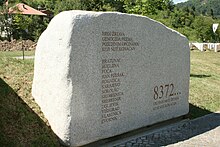
Back إنكار الإبادة الجماعية في البوسنة والهرسك Arabic Penyangkalan genosida Bosnia ID Negacionismo do genocídio bósnio Portuguese
| Part of a series on |
| Denial of mass killings |
|---|
| Instances of denial |
|
| Scholarly controversy over mass killings |
| Related topics |

Bosnian genocide denial is the act of denying the occurrence of the systematic Bosnian genocide against the Bosniak Muslim population of Bosnia and Herzegovina, or asserting it did not occur in the manner or to the extent that has been established by the International Criminal Tribunal for the former Yugoslavia (ICTY) and the International Court of Justice (ICJ) through proceedings and judgments, and described by comprehensive scholarship.
In its judgment, the ICJ adopted the ICTY's conclusion from Radislav Krstić's conviction and concluded what happened in and around Srebrenica was done by members of the Army of Republika Srpska (VRS) "with the specific intent to destroy in part the group of the Muslims of Bosnia and Herzegovina as such, which constitute acts of genocide committed". The two international courts have ruled differently only concerning direct responsibility for acts of genocide in Bosnia and Herzegovina. The ICJ, in a proceeding of Bosnian genocide case that was brought by Bosnia and Herzegovina against Serbia and Montenegro, has made rulings to the extent that Serbia was not directly responsible for the perpetration of genocide but was responsible under "customary international law" for violating the obligation to "prevent and punish the crime of genocide". Other international bodies, such as the European Court of Human Rights and the United Nations General Assembly, have also passed resolutions acknowledging genocide occurred in Bosnia. German courts have made convictions based upon a more expansive interpretation of genocide than that used by international courts.
The origins of denial lie within groups of Serbian and international scholars, and are supported in part by Serb and international political bodies and media. After the Bosnian War, Serb culture generated a stance Serbs were the aggrieved party and that historical events had curtailed national goals. Sonja Biserko has drawn parallels with other examples of negationist historical revisionism and denialism, such as denial of genocides in Armenia and Rwanda.
During the Yugoslav Wars, Serb policies and their foremost protagonists have been whitewashed and justified by some "anti-war" and "anti-imperialist" public intellectuals and authors abroad, mostly on the left side of the ideological spectrum, but also by "libertarian" right-wingers, and this has sometimes become outright denial.
© MMXXIII Rich X Search. We shall prevail. All rights reserved. Rich X Search